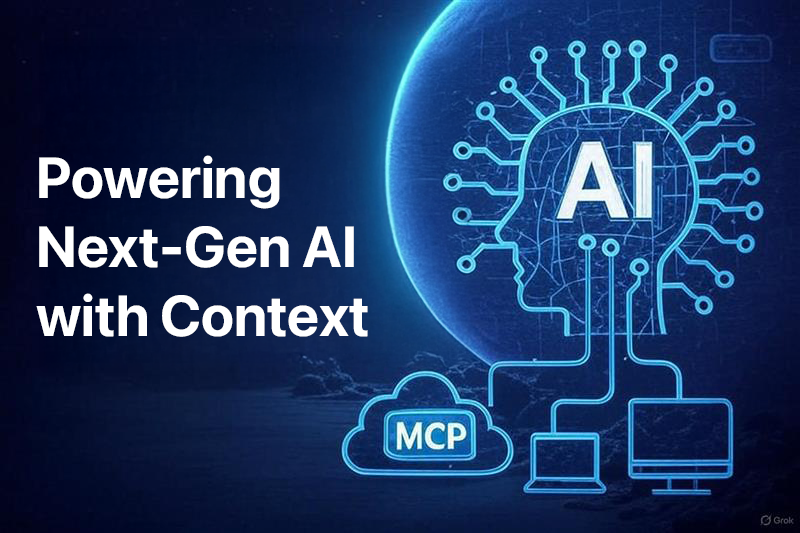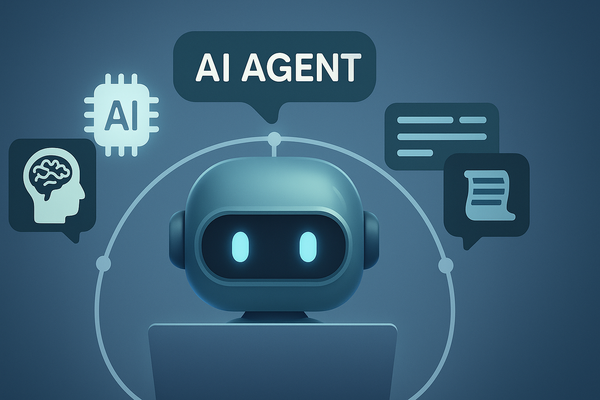Model Context Protocol at the Core of Next-Gen AI Transformation
powering smarter, scalable next-gen AI applications.

As companies continue to embrace AI-based solutions and cloud computing, the necessity for smooth integration and improved AI capabilities has never been greater. One of the driving forces behind this advancement is the Model Context Protocol (MCP), which is emerging as a critical element for next-generation AI applications. In this article, we'll discuss why MCP is crucial for companies that want to integrate AI, streamline workflows, and foster innovation in their digital transformation process.
What Is Model Context Protocol?
Fundamentally, the Model Context Protocol (MCP) is a communication protocol that aims to facilitate how AI models exchange information and context. It's especially applicable for cloud-native AI platforms to ensure interoperability for various AI tools, agents, and systems. Properly implemented, MCP can greatly lower the friction of AI integration, resulting in accelerated development cycles, better system interoperability, and smarter automation flows.
The MCP Role in AI Integration
MCP is revolutionizing the AI integration landscape. As companies integrate more AI agents, cloud-based tools, and machine learning (ML) models into their processes, the data context complexity increases exponentially. MCP addresses this by providing a single protocol that allows tools to exchange real-time data, collaborate, and perform tasks on various AI platforms.
AI tool interoperability is made possible with MCP, enabling companies to combine and match technologies without the typical hindrances. This is important as the need for flexible, cross-platform applications keeps growing.
Key Features of Model Context Protocol
MCP AI Standard
One of the characteristic aspects of MCP is that it can normalize interactions across AI systems. This provides a more ordered and predictable landscape for developers and data scientists to work in, so that AI models can be scaled and modified without the necessity for continuous re-tuning.
LLM Context Management
With large language models (LLMs) becoming the focal point in AI research, controlling the context of such models has become paramount. MCP provides solutions for context management for LLMs so that they function properly in multi-agent scenarios by maintaining state and context over many API calls and integrations.
MCP Security Model
Security is never an issue with sensitive information. MCP serves to mitigate such concerns by encrypting and making data safe as it passes between AI models, giving companies reassurance as they switch to more advanced AI systems.
Applications and Examples in the Real World
Multiple industries are already seeing benefits through MCP's ability to integrate:
Healthcare
- In use cases like patient data analysis or medical imaging
- MCP integration for Claude Desktop enables:
- Real-time data processing
- Ensured data accuracy
- Compliance with security standards
Finance
- MCP is used by financial institutions to:
- Handle intricate data sets in cloud-native AI systems
- Integrate machine learning models for:
- Real-time fraud detection
- Risk assessment
E-commerce
- Retailers leverage MCP to integrate:
- AI-based recommendation engines
- Chatbots
- Stock management systems
- The result:
- Optimized customer experience
- Improved back-end efficiency
Setting Up MCP: Server & Client Implementation
For companies interested in utilizing the entire potential of Model Context Protocol, MCP server installation and MCP client implementation are not something to be ignored. MCP server is the central hub for connection management and data exchange between multiple AI tools and models. MCP client, conversely, is tasked with sending requests and receiving information from the server to enable seamless interaction between elements.
Integrating MCP SDK Python or MCP JSON-RPC simplifies the development of strong, scalable systems that fit well with existing AI models. With these tools, companies are able to improve their time-to-market for AI-driven solutions.
MCP and the Future of AI Development
As we head towards MCP adoption in 2025, it is obvious that this protocol will become increasingly central to digital business transformation. Securing AI model context sharing and facilitating integration among heterogeneous systems, MCP will be the driving force behind the intelligent automation, machine learning, and AI model deployment of the future.
Furthermore, comparing MCP vs. OpenAI function calling reveals how MCP’s more structured protocol offers advantages in creating robust, context-aware AI systems that can interact with other models more efficiently than OpenAI’s broader, but less specialized, function calling methods.
Why Choose MCP for Your Business?
- Enhanced Collaboration: With MCP plugin development, businesses can extend the protocol’s capabilities and tailor it to their specific use cases.
- Future-Proof: With MCP continuously advancing, its mass adoption will guarantee your AI systems stay future-proof with respect to upcoming technologies and standards.
- Scalable Architecture: Whether you're building an AI application at a small scale or enterprise-level systems, MCP allows your architecture to scale with ease.
Conclusion
The Model Context Protocol is not only a technical innovation—it's a strategic tool for any organization getting ready for the next wave of AI use cases. From enhancing AI tool interoperability to facilitating secure, scalable, and context-aware integrations, MCP is establishing a new benchmark for how companies deploy and interconnect intelligent systems. As we head towards a future of highly coordinated AI agents and real-time decision-making, embracing a protocol such as MCP is an essential step towards remaining competitive and innovative.
If you want to update your infrastructure and integrate AI into your processes seamlessly, collaborate with us for professional digital transformation and cloud solutions. Our experts can assist you through each phase from strategy to implementation so that your systems are future-proof.
Frequently Asked Questions
1. What is the Model Context Protocol?
MCP is a communication standard that facilitates seamless data exchange and context handling among AI systems, making them interoperable and scalable.
2. How does MCP enhance AI integration?
MCP standardizes the communication between AI models, which enables companies to combine and integrate AI tools without any compatibility issues.
3. Is MCP secure?
Yes, MCP has a strong security model to safeguard sensitive information while integrating and using AI.
4. How do I install MCP on my AI systems?
To install MCP, you need to install an MCP server and client, and integrate tools such as MCP SDK Python and MCP JSON-RPC.
5. Can MCP integrate with existing AI tools?
Indeed! MCP is built to be easily integrated with a variety of AI systems, allowing companies to augment their current tools and models.




